Assistance for the Needy
Assistance to families in financial difficulties is provided in two areas:
- Help in purchasing basic staples for babies, such as baby formula and diapers
- Help in purchasing basic food staples for families
Eligibility for assistance is determined by defined and delineated criteria, which require the submission of a letter of recommendation and/or a report by a social worker who is personally involved and who can attest to a family’s need.
Our mission is to provide basic nourishment for babies in need to ensure their emotional and physical development.
Assistance for the Sick
A large portion of the organization’s effort is geared toward helping the sick who:
- Cannot afford the cost of medication that is not covered by the national formulary (insured medications)
- Need assistance in the restoration of the oral cavity, mouth, palate and teeth damaged during radiation and chemo treatments
The organization focuses on helping sick children under the age of 18 in the purchase of life-saving and life-extending drugs.
A committee of expert professionals, reviews, examines and verifies each and every application for assistance and then, with consideration of the organization’s financial ability, determines the level of assistance to be provided
The Ish Tzaddik Haya nonprofit organization operates all over Israel, from the Golan Heights in the north to Eilat in the south. Ish Tzaddik Haya operates based on clearly structured criteria as do all its support committees. The organization is in constant communication with municipal social workers who refer families that are eligible for assistance.
Board Members
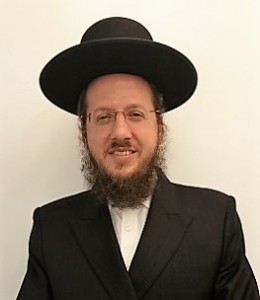
Rabbi Chaim Eideles
The image of my holy grandfather, Rabbi Aryeh Levin, is always before my eyes as is his incredible life work and his pure desire for every Jewish neshama, regardless of background, to be joyous and loved.
In my work with people over the years, I too have witnessed much pain, suffering, and life debilitating hardships. This prompted my resolve to establish Ish Tzaddik Haya: A not-for-profit organization with the mission to provide, with Hashem’s help, spiritual, emotional and physical assistance, free of charge. I pray that each and every Jew’s desires will be fulfilled l’tova, for the good.
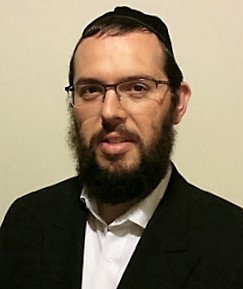
Rabbi Michael Levin
Rabbi Eideles truly continues in spirit and in deeds the work of Rabbi Aryeh Levin, both in seeing into the hearts of those who seek his help as well as in his chesed activity. I recognize in the Ish Tzaddik Haya organization and in its members a pure and deep desire to do for and give to others without an inkling of selfishness or self-interest.
The organization’s ability to provide for those in need in the most respectful, modest and discreet fashion amplifies its worthiness and value.
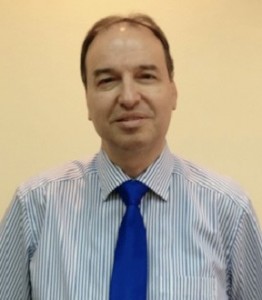
Dr. Shlomo Nass
During our daily activity of business, we come across individuals and families who face economic difficulties in a variety of situations. Ish Tzaddik Haya under the leadership of Rabbi Chaim Eideles is successful in providing those in need with support and appropriate and applicable solutions. The organization’s blessed efforts on behalf of the population make a marked difference.
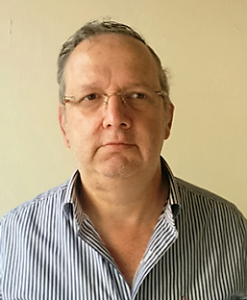
Mr. Roni Baums
The Ish Tzaddik Haya organization dispenses chesed through Torah and acts of kindness. It is always gratifying to witness the standing room only captivating lectures of Rabbi Eideles at our home. And it is heartwarming to witness the main activities of providing food for hungry babies and caring for the oral well-being of cancer-stricken children.
The organization, in cooperation with social and case workers from around the country, identifies and provides needed assistance to individuals and families whose needs are not met by the national department of health and welfare agencies.
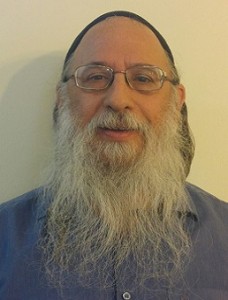
Mr. David Shirel
The Ish Tzaddik Haya organization was established in memory of Rabbi Aryeh Levin ztz”l. The organization’s effort on behalf of those less fortunate is inspired by the deeds of the great tzaddik.
Rabbi Chaim Eideles shlita, continues the labors of Rabbi Aryeh Levin as he does much to spread the light of Torah. Rabbi Eideles is constantly engaged in helping others, working day and night to provide spiritual and practical guidance and offers support to those in need.
אריה לוין =312 = אור ליהודים = כל אדם עולם מלא = גדול עם קטן
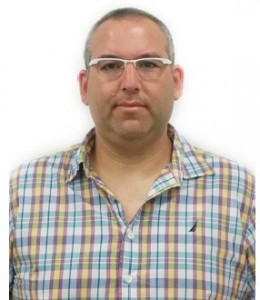
Mr. Ro’i Shtern
"ואהבת לרעך כמוך" – Love your fellow as yourself. . . People have the right to live with dignity in our society and to provide nourishment for their babies that ensures their children’s physical and cognitive growth and development. It is vital for children to be raised in suitable environments, with ample food, respectable attire, and proper shelter. The state of families in our population reflects the state of our society, and as such, by helping families in need we assure their integration into society in a dignified fashion.
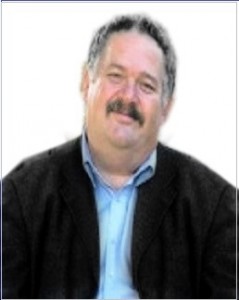
Mr. Chanan Bar Sela
The Ish Tzaddik Haya organization operates in compliance with its stringent policies and conducts its activities under the strict halachic guidance of Rabbi Chaim Eideles Shlita. One of the organization’s special attributes is the certainty and the security that contributors have of knowing that 100% of funds donated goes to the needy. In addition, the organization follows the halachic dictate and abides by the instruction given by the donors and uses any donated funds for the specific need for which it was assigned.
"עולם חסד יבנה".
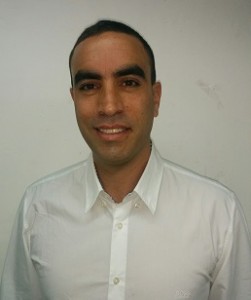
Mr. Udi Aonina
"כל יהודי צריך להיות מרוצה מהנהגתו יתברך"
I have had the privilege of meeting Rabbi Eideles and other board members of the Ish Tzaddik Haya nonprofit organization, who represent a myriad of industries and services. All of them gladly contribute of their expertise and time with much humility and modesty. I feel privileged to join and contribute my time and my effort to this incredible endeavor.
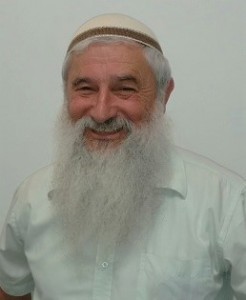
Mr. Tuvia Mermelstein
"סומך ה’ לכל הנופלים וזוקף לכל הכפופים" – Hashem supports those in need and straightens the bowed.
Members of the Ish Tzaddik Haya nonprofit organization, under the leadership of Rabbi Chaim Eideles, are successful in their efforts to deliver practical support to those in need, with compassion and empathy. Many organizations do much to help the destitute, but ours seek out those whose needs are overlooked. We are directed by Pirkei Avot (2:5) “במקום שאין אנשים, השתדל להיות איש” ~ In a place where there are no men, strive to be a man.
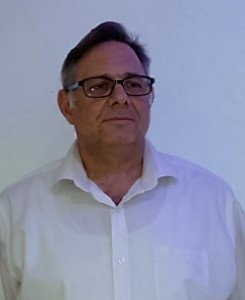
Mr. Israel Orlan
After a long career with Israel’s national security, I have changed course and these days devote my time to the cause of national unity as entailed in words of the prophet Isaiah (41:6) "לאיש את רעהו יעזורו ולאחיו יאמר חזק" - Each one shall aid his fellow and to his brother he shall say, "Strengthen yourself”. A nation’s strength is measured by its people’s mutual support and motivation to contribute for the common good.
These days I meet previously people of means whose finances have been decimated by medical bills. As not one of us is immune to changing fortunes, we must all mobilize to support those in need and pray never to be in such circumstances ourselves.
The Ish Tzaddik Haya nonprofit organization was established in memory of Rabbi Aryeh Levin
Rabbi Aryeh Levin was the youngest child of Reb Binyamin Beinush, a forester and a Torah scholar, and Ethel, on the sixth day of Nissan, in 5645 (1885), in the small town of Orla, near the city of Bialystock, Belarus. Rabbi Levin left home in pursuit of Torah study at a young age. He attended several yeshivas, among them in the cities of Brisk and Pinsk, where his devotion to learning and his reputation as an illui spread. Rabbi Levin hoped to study at the famous Volozhin Yeshiva but at first was denied due to his age. However, after studying for some years with Grand Rabbi Zalman Meltzer of the Slutzk and a year at the yeshiva in Hlusk, Rabbi Levin was accepted at the Voluzhin Yeshiva.
While at the Volozhin Yeshiva, Rabbi Aryeh Levin wrote: “In those days as war between Russia and Japan was threatening, I was determined to fulfill my secret and long-held yearning to immigrate to the holy land, and I was but 19 years of age.”
After much effort to raise funds and obtain the necessary documents Rabbi Aryeh Levin bid his parents farewell. When he arrived in Israel during the month of Adar of 5665 (1905), he wrote, “. . . and when I saw from a distance the holy land that Hashem promised to our forefathers to grant to us, I’ve become a different person: Fervent and full of emotion, tears flowing from my eyes. I said then, ‘I shall die this time, as Hashem granted me the zchut to enter the land of my fathers. I forgot all my pain and struggles as a new spirit entered my soul, a spirit of joy and endless spiritual pleasure. My tears flowed in recognition that I merited to enter the holy land, the land that men and angels desire to behold. As I disembarked and first treaded on the holy ground, I felt the holiness with each and every step taken”.
On the 11th of Tamus, several months after his arrival to Israel, Rabbi Aryeh Levin married Chana, the daughter of Rabbi David Shapiro, the brother in law of Rabbi Pesach Frank. Rabbi Aryeh settled in Jerusalem, attended the Torahs Chaim Yeshiva, and in 5669 (1909) received his rabbinical ordination from the Grand Rabbi Chaim Berlin (the son of the Netziv of Volozhin), Rabbi Shmuel Salant and Rabbi Avraham Yitzchak HaCohen Kook, with whom he had a close relationship. From 5677 (1917) until the end of his days, Rabbi Aryeh Levin was the Spiritual Mashgiach (advisor) in the Etz Chaim Yeshiva in Jerusalem.
Rabbi Aryeh Levin was addressed by all as Reb Aryeh and was widely known as the “Father of the prisoners”. For 25 years, during the British Mandate in Israel, Reb Aryeh visited Jewish prisoners in an effort to boost their morale and convey their messages to their families. He was especially known for his regular visits with the Jewish underground prisoners (members of the Palmach, Haganah, Irgun and Lechi). Reb Aryeh was also a regular visitor at the hospital for lepers where he encouraged and reassured the sick. When the chief Rabbi of Israel (then Palestine), Rabbi Abraham Isaac Kook, was asked why he recommended Reb Aryeh Levin to the position of prisoners’ chaplain, he said that “In Reb Aryeh there is the capacity to perform chesed with the entire being (body) and in that is the secret of his neshama (soul) and the repair of the world (Tikkun Olam).” Rabbi Kook added that “if there were three Jews in Reb Aryeh’s caliber in our generation, Moshiach would arrive.”
Reb Aryeh’s sublime character traits of humility, kindness, respect and love for all and compassion for the needy were legendary in Jerusalem. He and his wife lived in modest and impoverished home, but he refused any offer of assistance. He once told a companion while attending a funeral, “Many friends tried to persuade me to move to a more spacious apartment, but I refused. After years of living, a man is lead from his home to a grave. The transition will not be a difficult one for me, as there is not much of a contrast . . .”
Reb Aryeh’s face would light up upon meeting people, especially the young. He used to caress children’s faces expressing paternal affection. He said once to a companion, “If we are commanded to favor the stones and the dust of Israel, as it says, ‘כי רצו עבדיך את אבניה ואת עפרה יחוננו’ ~ ‘And thy servants shall take pleasure in her stones and love her dust’ (psalms 102:15), how much more then should we favor the children of Israel in the land of Israel?”.
Numerous stories have been associated with the Jerusalemite Tzaddik, Reb Aryeh, many of which were published in two books, compiled by author Simcha Raz: A Tzaddik in Our Time: The Life of Rabbi Aryeh Levin and its sequel, Tzaddik Yesod Olam. Among others, there is a story that occurred just hours before Reb Aryeh’s death when he was approached by journalist Eliyahu Amikam. Reb Aryeh pointed at two verses in Tehillim, “יושיע ציון ויבנה ערי יהודה… ואוהבי שמו ישכנו שמה” – “[God] will build the cities of Judah . . . and they that love His name will dwell therein” (Psalms 69:36, 37), and explained: “First came the Bilu’im (a movement with a mission focused on the agricultural settlement of the Land of Israel) and their successors. Now we are in the second phase, we must build the cities of Judah. Only then will the third stage be upon us, the period of love of Hashem. This period shall arrive . . . “
The many stories overshadow another aspect of the Rabbi’s personality. Reb Aryeh was an erudite Torah scholar, respected, appreciated and the confidant of the most notable rabbis of his time. During his life Reb Aryeh did all to conceal his greatness, however in his will in which he provided his children with guidance, some of his inner world was revealed. They learned then about the times when Reb Aryeh helped others at great sacrifice to himself.
Reb Aryeh rejected all honors, and when he was chosen to receive the prestigious citizenship award, Yakir Yerushalayim (Worthy Citizen of Jerusalem), he refused. Many tried to persuade him but Reb Aryeh declined without providing an explanation.
Reb Aryeh was once asked about his rejection of the honor and in an untypical moment of openness, he said, “One shall not open a window in a darkened house” (meaning that when a house is darkened one cannot perceive its shortcomings). Such a man was Reb Aryeh, whose modesty and humility prevented him from seeing his own worth. Reb Aryeh also said “I always tried to be of those who are insulted but do not insult in return, who are shamed, but do not shame in return, and I prayed that no one would be punished with me as cause.”
A story is told by Rabbi Zilbershtein, shlita, about his grandfather: Once, when Reb Aryeh was teaching students, the President of Israel, Mr. Zalman Shazar ob”m came for a visit. He sent an emissary to ask for an audience with Reb Aryeh, and the Rabbi replied, ‘I am now engaged in the study of Torah. If the issue at hand is important enough to delay learning, I am ready to meet, but if not, please let us postpone the meeting until tomorrow’. The president left and returned the next day to share the following story: At an amnesty ceremony in the United States, a pardoned prisoner was asked by the chief justice (heard by the guest who accompanied President Shazar on the visit to Reb Aryeh), “Will you continue to steal in the future?” To which the prisoner, after a moment of contemplation, responded, “Only once more. I need to find a watch for Reb Aryeh Levin. He does not have a watch.”
The prisoner explained that while in prison, Reb Aryeh Levin taught them about the virtue of truth-telling, and that Reb Aryeh’s words impacted him so that he took upon himself to stop stealing in order to avoid having to tell falsehoods. But he so admired the rabbi that he desired to gift him with a watch. The guest was so impressed with the story, he asked to accompany President Shazar on a visit with Reb Aryeh, but since the visit was not sufficiently important to take away the rabbi from his study, they postponed their visit to the next day.
Rabbi Aryeh Levin died on the ninth day of Nissan 5729 (1969) and was buried at the Sanhedria Cemetery near his wife. In his will, Rabbi Levin continued to care for his fellow Jews. He wrote “All those that I was tied to in my life, especially those so close to me that I felt their anguish, I shall not forget them. In the event that I shall merit after twelve months, I will beseech and ask for mercy before the heavenly throne . . . ”
“כל אלו שהייתי קשור אליהם בחיי, בפרט לאלו שהתקרבו אלי בקרבת אלוקים והרגשתי בצערם ובסבלם, לא אשכחם, אם תהיה לי איזו זכות אחר י”ב חודש לבקש רחמים לפני כיסא הכבוד…”
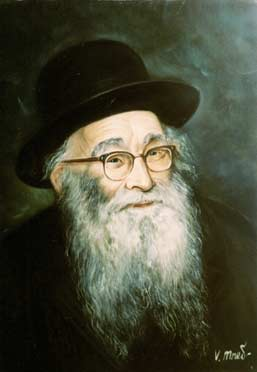
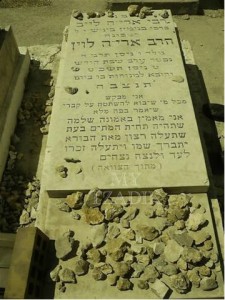

Recent Comments